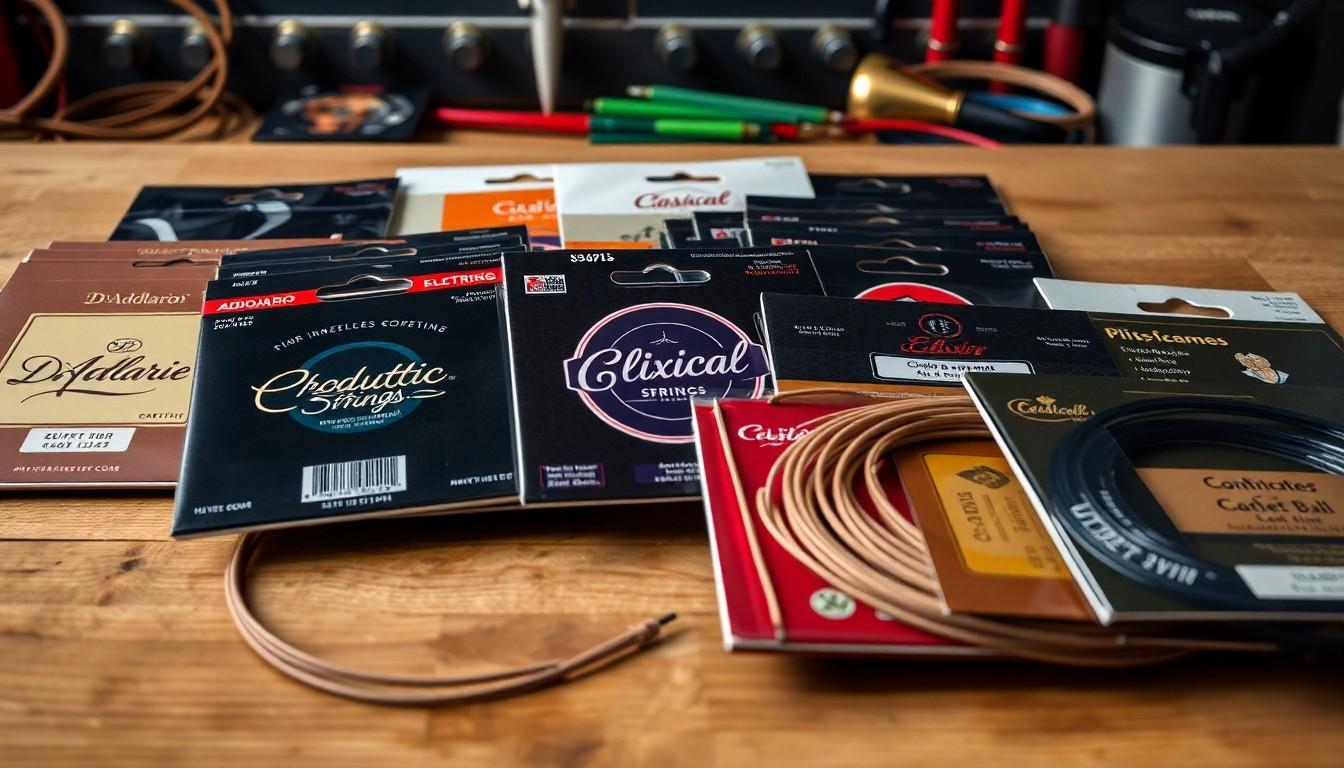Every guitarist knows that feeling – your strings sound duller than a Monday morning meeting, and it’s time for a fresh set. Whether you’re a seasoned player or just starting out, understanding the cost of restringing a guitar can save both your wallet and your sanity.
From budget-friendly DIY solutions to professional setups that’ll make your instrument sing like an angel, restringing costs can vary widely. The price depends on factors like string quality, labor charges, and whether you’re brave enough to tackle the job yourself or prefer leaving it to the pros. Let’s dive into the nitty-gritty of guitar string replacement costs and help you make the best choice for your beloved six-string companion.
How Much Does It Cost To Restring A Guitar
Guitar restringing costs vary based on service type and string quality. The price ranges from $10 for basic DIY solutions to $75 for professional services with premium strings.
Professional Service Pricing
Professional guitar restringing services charge between $25 to $75 per set. The cost breakdown includes:
| Service Component | Price Range |
|---|---|
| Labor | $20-35 |
| Basic Strings | $5-15 |
| Premium Strings | $25-40 |
| Setup Adjustment | $15-25 |
Local music shops offer standard restringing packages starting at $35, including basic strings and labor. Premium services include string installation, neck adjustment and intonation checks for optimal playability.
DIY Restringing Costs
DIY restringing requires only the cost of new strings and basic tools. A string set costs:
| String Type | Price Range |
|---|---|
| Economy Strings | $5-10 |
| Mid-Range Strings | $12-20 |
| Premium Strings | $25-40 |
| Coated Strings | $30-45 |
Essential tools include wire cutters ($8) and a string winder ($5). Multi-tool kits containing all necessary items cost $15-25. These tools serve multiple string changes, reducing the per-restring cost over time.
Types of Guitar Strings and Their Prices

Guitar strings come in distinct varieties designed for specific instruments with prices varying based on material quality construction methods.
Acoustic Guitar Strings
Acoustic guitar strings consist of bronze phosphor bronze or 80/20 bronze wrapped around a steel core. Entry-level phosphor bronze sets cost $7-$12 featuring brands like D’Addario Ernie Ball Martin. Mid-range sets from manufacturers like Elixir retail between $15-$25 with coated strings for extended life. Premium strings from boutique makers such as Santa Cruz DR cost $30-$45 per set offering enhanced tone durability.
| String Type | Price Range |
|---|---|
| Entry-Level | $7-$12 |
| Mid-Range | $15-$25 |
| Premium | $30-$45 |
Electric Guitar Strings
Electric guitar strings use nickel-plated steel pure nickel or stainless steel materials. Basic nickel-plated sets from brands like Ernie Ball GHS start at $5-$10. Mid-tier options including D’Addario NYXL Dunlop range from $12-$20. Professional-grade sets featuring specialized alloys premium coatings cost $25-$40 from manufacturers like Elixir String Theory.
| String Type | Price Range |
|---|---|
| Basic | $5-$10 |
| Mid-Tier | $12-$20 |
| Professional | $25-$40 |
Classical Guitar Strings
Classical guitar strings incorporate nylon trebles with silver-plated copper-wound bass strings. Standard nylon sets from brands like D’Addario La Bella range between $6-$15. Enhanced carbon treble strings with higher-grade bass windings cost $15-$25. Premium hand-wound sets from Savarez Augustine retail for $30-$50 offering superior tone projection.
| String Type | Price Range |
|---|---|
| Standard | $6-$15 |
| Enhanced | $15-$25 |
| Premium | $30-$50 |
Factors That Affect Restringing Costs
Guitar restringing costs vary based on multiple factors that influence both materials and service expenses. Each factor contributes to the final price differently, creating a range of potential costs for guitar maintenance.
String Material and Quality
String material selections directly impact restringing costs. Nickel-plated steel strings start at $5 per set, while pure nickel strings cost $15-$25. Premium materials like phosphor bronze for acoustics range from $20-$45 per set. Coated strings with extended lifespans command higher prices of $25-$50 but last 3-5 times longer than uncoated options. Titanium strings represent the premium segment at $30-$60 per set.
Labor Charges
Professional labor rates reflect expertise levels and service locations. Local music shops charge $20-$35 for basic restringing services. Specialized guitar technicians command $40-$75 per service. Urban areas typically see higher labor costs, with major cities averaging $45-$60 for standard restringing. Express services add $10-$15 to base rates. Shop overhead costs influence pricing, with established retailers charging more than independent technicians.
Guitar Type and Setup Needs
Each guitar type presents unique restringing requirements affecting overall costs. Electric guitars require $25-$45 for complete service due to bridge complexity. Acoustic guitars range from $30-$50 based on bridge pin systems. Classical guitars cost $35-$55 due to specialized string requirements. Floyd Rose tremolo systems demand $50-$75 for proper setup. Vintage instruments require additional care, adding $15-$25 to standard rates.
Where to Get Your Guitar Restrung
Guitar restringing services are available through multiple venues, each offering distinct advantages in terms of cost, expertise and convenience.
Local Music Shops
Local music shops provide personalized restringing services with experienced technicians who understand specific guitar models. These establishments typically offer same-day service with prices ranging from $25 to $50 for basic restringing. Independent shops often include complementary services like basic setup adjustments intonation checks. Many local shops maintain relationships with regular customers offering loyalty discounts membership programs that reduce restringing costs. Small music stores frequently stock a wide selection of strings from budget to premium brands letting customers choose their preferred strings for installation.
Guitar Centers and Chain Stores
Major retailers like Guitar Center Sam Ash Music Sweetwater provide standardized restringing services at consistent prices across locations. These stores offer restringing packages starting at $20 for basic string replacement reaching $65 for premium services. Chain stores maintain dedicated repair departments with certified technicians handling high volume services. Large retailers stock extensive string inventories providing immediate access to multiple brands price points. Most chain locations feature automated scheduling systems enabling customers to book appointments online track service progress through mobile apps.
How Often Should You Restring Your Guitar
Guitar string replacement intervals depend on playing frequency frequency maintenance habits. Professional musicians replace their strings every 2 weeks while performing weekly shows. Casual players change strings every 2 to 3 months with regular practice sessions.
Several indicators signal the need for new strings:
- Dark discoloration on the strings from oil buildup
- Noticeable reduction in sustain duration
- Dull or flat tone quality
- Visible rust spots or corrosion
- Difficulty maintaining proper tuning
- Physical damage like unwinding or kinks
Playing environment affects string longevity:
| Environment Factor | Impact on String Life |
|---|---|
| High humidity | 2-3 weeks reduction |
| Excessive sweating | 1-2 weeks reduction |
| Climate control | 2-4 weeks extension |
| Regular cleaning | 3-4 weeks extension |
String material determines replacement frequency:
- Nickel-plated steel strings last 2-3 months
- Pure nickel strings maintain tone for 3-4 months
- Coated strings extend life to 4-6 months
- Nylon strings remain playable for 6-8 months
Practice habits influence restringing schedules:
- Daily practice (3+ hours): Monthly replacement
- Weekly practice (5-7 hours): Quarterly replacement
- Occasional play (1-3 hours weekly): Bi-annual replacement
- Performance use: Bi-weekly to monthly replacement
Regular maintenance extends string life through proper cleaning after each session wiping down strings removing hand oils debris. Storing guitars in cases with controlled humidity preserves string quality between playing sessions.
Tips for Saving Money on Guitar Restringing
Bulk purchasing guitar strings reduces costs by up to 40% when buying 3 or more sets at once. String manufacturers offer multipack options that provide significant savings compared to individual set purchases.
Learning DIY restringing eliminates recurring labor costs through these steps:
- Watch online tutorials from reputable guitar manufacturers
- Practice on an inexpensive instrument first
- Invest in a basic toolkit costing $15 to $25
- Store extra strings properly in sealed containers
Joining guitar forums unlocks access to:
- Group buys for discounted strings
- Local shop promotions
- Member exclusive deals
- Seasonal sale notifications
Smart shopping strategies include:
- Comparing prices across multiple retailers
- Taking advantage of holiday sales events
- Signing up for retailer newsletters
- Using price tracking tools for online stores
Regular maintenance extends string life through:
- Wiping strings after each use
- Storing guitars in cases
- Maintaining proper humidity levels
- Washing hands before playing
- Student discounts (10-15% off)
- Loyalty programs
- Package deals combining strings with setups
- Price matching with major retailers
| Cost Saving Method | Potential Savings |
|---|---|
| Bulk Purchase | 30-40% |
| DIY Restringing | $20-50 per service |
| Student Discounts | 10-15% |
| Holiday Sales | 20-35% |
| Loyalty Programs | 5-20% |
Guitar restringing costs can vary significantly based on multiple factors including string quality professional services and DIY approaches. The investment ranges from $10 for a basic DIY job to $75 for premium professional services. While professional restringing offers convenience and expertise DIY methods provide substantial cost savings over time.
Whether choosing professional services or learning to restring at home guitarists should consider their playing frequency budget and skill level when making this decision. With proper maintenance and smart shopping strategies like bulk buying and taking advantage of sales musicians can keep their instruments sounding great without breaking the bank.





